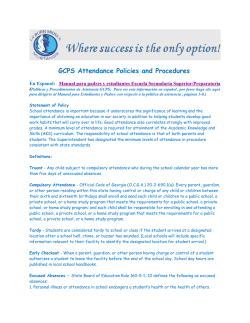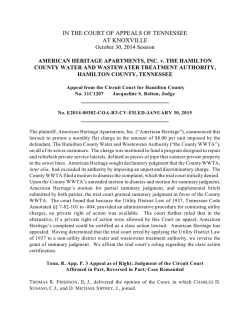
In Re Guardianship of Taylour L., et al.
IN THE COURT OF APPEALS OF TENNESSEE AT JACKSON October 22, 2014 Session IN RE GUARDIANSHIP OF TAYLOUR L., ET AL. Appeal from the Probate Court for Shelby County No. D15303, D15304, D15305, D15306 Robert Benham, Judge No. W2013-01296-COA-R3-CV - Filed January 29, 2015 This appeal concerns a guardianship proceeding for four children. The mother of the children (“Mother”) was killed while on duty as a police officer. The children’s maternal grandmother and the father (“Father”) of three of the children sought custody of all four children. The trial court ultimately awarded custody to the children’s maternal grandfather (“Grandfather”), although Grandfather was not a party to the proceedings and did not request guardianship of the four children. Father appeals, asserting that the trial court erred in not awarding custody to him. We have determined that the trial court erred in awarding Grandfather guardianship of Father’s three biological children without first determining that there would be a substantial risk of harm to the children should Father be appointed guardian. Furthermore, we find that the trial court erred in awarding Grandfather guardianship of Mother’s fourth child without conducting a thorough best interest analysis. Therefore, we vacate the trial court and remand for further proceedings. Tenn. R. App. P. 3 Appeal as of Right; Judgment of the Probate Court Vacated and Remanded A NDY D. B ENNETT, J., delivered the opinion of the court, in which J. S TEVEN S TAFFORD, P.J., W.S., and D AVID R. F ARMER, S P. J., joined. Kathleen L. Caldwell, Memphis, Tennessee, for the appellant, Darius L. Stephen R. Leffler, Memphis, Tennessee, for the appellee, Vivian W. Flordia M. Henderson, Memphis, Tennessee, Guardian Ad Litem. OPINION F ACTUAL AND P ROCEDURAL B ACKGROUND MarToiya L. (“Mother”) and Darius L. (“Father” or “Mr. L.”) were married in 1998. Three children were born of the marriage—Taylour L. (16 years old), Dariyn L. (15 years old), and Naia L. (14 years old) Mother and Father separated in 2007 and never lived together as husband and wife following their separation. During the parties’ separation, Mother had a fourth child, Xaria L. (4 years old); however, Mr. L. is not the biological father of Xaria.1 Also during the parties’ separation, Mr. L. fathered two children with his live-in girlfriend. On January 4, 2008, Mother filed a complaint for divorce, which was eventually dismissed for want of prosecution. On February 23, 2011, Mother filed a second complaint for divorce. On December 14, 2012, Mother was tragically shot and killed while in the line of duty as a police officer. On December 21, 2012, the children’s maternal grandmother, Vivian W. (“Grandmother”), filed a petition seeking to be appointed guardian of all of the children. Grandmother asserted that Father had a history of domestic abuse and that he had failed to pay child support or participate in the children’s lives since 2009. On December 28, 2012, Father filed a response and counter-petition seeking to be appointed guardian of the four children. On February 25, 2013, the trial court entered a consent order of temporary guardianships which provided that Naia and Xaria would reside with Grandmother; Dariyn would reside with her paternal uncle; and Taylour would reside with Father. The order also required Father and Grandmother to undergo psychological evaluations and engage in family counseling with the children. Father was ordered to pay child support and provide insurance, among other things. The trial court then held hearings in March and April 2013, at which twenty-two witnesses testified.2 The trial court entered findings of fact and conclusions of law on April 19, 2013 and determined that neither Father nor Grandmother should be awarded guardianship of the children.3 In reaching its conclusion, the trial court found, inter alia, that Father had very little interaction with his children following the separation of the 1 The parties assumed that Chauncey S. (Mr. S.) was the biological father of Xaria; however, DNA tests results introduced at trial showed that Mr. S. was not Xaria’s father. The record does not include the identity of Xaria’s father. 2 We will discuss the testimony as it relates to the issues on appeal. 3 Grandmother does not appeal this ruling. 2 parties; Father had difficulty communicating with his daughters; Father received $30,000 following the death of Mother but failed to pay child support, choosing, instead to purchase an extended cab pick-up truck; Father pled guilty to stalking and served eleven months in jail; and Father had a history of physical altercations. The court emphasized that the proceeding was “not a custody hearing” and went on to apply Tenn. Code Ann. § 34-2-103. The court concluded: [I]t is not to the best interest of these four (4) children for their father, Darius L[.], to be appointed as Guardian of the Person of these children at this time. As set forth above, Darius L[.] has anger management problems, has not followed the Orders of this Court, has neglected his children over an extended period of time, and is living in a domestic situation that is not conducive to instilling appropriate behavior for these children. The court determined that the children’s maternal grandfather, Marvin W. (“Grandfather”) should be appointed guardian of all four children. The trial court’s factual findings regarding Grandfather are as follows: 33. Marvin W[.], the father for Martoiya L[.], and his former wife, Vivian W[.], appear to have a “friendly” relationship. 34. Over the years, and especially since the separation of Martoiya L[.] and Darius L[.] in 2007, Marvin W[.] has been a primary support giver for his grandchildren. He has been active in their extra-curricular activities; has provided transportation to and from school for them; and has supervised their activities while their mother was working as a Memphis Police Officer. 35. The Court interviewed the three (3) oldest children of Martoiya L[.] in the presence of the Court Reporter, the Guardian Ad Litem, and counsel for Darius L[.] and for Vivian W[.]. 36. From this interview, the Court finds that these three (3) children have a close and respectful relationship with their grandfather, Marvin W[.] Finally, the court held that, as guardian of the four children, Grandfather is “empowered to make all decisions regarding the appropriate education, housing needs, extra-curricular activities and medical decisions” related to the children. Father appeals, asserting that the trial court deprived him of his constitutional rights to the care and custody of his children without a finding that he poses a substantial risk of 3 harm to the children or is an unfit parent. He further argues that the court abused its discretion by allowing the children’s guardian ad litem to serve as an attorney ad litem. S TANDARD OF R EVIEW In an appeal of a decision rendered after a bench trial, we review the trial court’s findings of fact de novo with a presumption of correctness unless the preponderance of the evidence is otherwise. T ENN. R. A PP. P. 13(d); Union Carbide Corp. v. Huddleston, 854 S.W.2d 87, 91 (Tenn. 1993). We review questions of law de novo, with no presumption of correctness. Nelson v. Wal-Mart Stores, Inc., 8 S.W.3d 625, 628 (Tenn. 1999). A NALYSIS The trial court determined that Grandfather was the appropriate person to appoint as guardian of three of Father’s biological children and one child unrelated to Father. In coming to this conclusion, the trial court cited Tenn. Code Ann. § 34-2-103 and focused its analysis solely on the best interest of the children. Father asserts that the trial court deprived him of his constitutional rights to the care and custody of his children by failing to find that he posed a danger of substantial harm to the children prior to conducting a best interest analysis. Because this presents a question of law, we review the trial court’s decision de novo, with no presumption of correctness. See Nelson, 8 S.W.3d at 628. The section of the trial court’s final order, in which it sets out its “conclusions of law,” states, in its entirety: This is not a custody hearing. This is a hearing to determine the Guardian of the Person only of the four (4) children of Martoiya L[.]. Previously, Guardian of the Estate has been appointed to handle their assets. The primary legal authority is found in Title 34, Chapter 2, §§ 101 through 106 of the Tennessee Code. The Court’s primary guideline is Tenn. Code Ann. § 34-2-103, which follows: 34-2-103. Priority of persons to be considered. Subject to the court’s determination of what is in the best interests of the minor, the court shall consider the following persons in the order listed for appointment of the guardian: (1) The parent o[r] parents of the minor; (2) The person or persons designated by the parent or parents in a will or other written document; (3) Adult siblings of the minor; 4 (4) Closest relative or relatives of the minor; and (5) Other person or persons . . . As such, it is the duty of this Court to determine what is in the best interests of these four (4) children. From the abundant Findings of Fact above, it is apparent that it is not to the best interest of these four (4) children for their father, Darius L[.], to be appointed as Guardian of the Person of these children at this time. As set forth above, Darius L[.] has anger management problems, has not followed the Orders of this Court, has neglected his children over an extended period of time, and is living in a domestic situation that is not conducive to instilling appropriate behavior for these children. Further, as stated above, it is not to the best interest of these children for Vivian W[.] to be their Guardian. The Court finds the person best situated to assume the duties of Guardian of the Person of the four (4) children, subject to these Orders, is in fact their grandfather, Marvin W[.]. The above-referenced Statute is very clear and this Court is following the guideline as established by Statute. Under the United States and Tennessee Constitutions, a parent has a fundamental liberty interest in making decisions concerning the care, custody, and control of his or her child(ren). Troxel v. Granville, 530 U.S. 57, 65-66 (2000); Quilloin v. Walcott, 434 U.S. 246, 255 (1978) (“We have recognized on numerous occasions that the relationship between parent and child is constitutionally protected.”); Stanley v. Illinois, 405 U.S. 645, 651 (1972); Nash-Putnam v. McCloud, 921 S.W.2d 170, 174 (Tenn. 1996). In disputes between a parent and a non-parent, parents are afforded a “presumption of ‘superior parental rights.’” In re B.C.W., No. M2007-00168-COA-R3-JV, 2008 WL 450616, at *3 (Tenn. Ct. App. Feb. 19, 2008) (quoting Blair v. Badenhope, 77 S.W.3d 137, 141 (Tenn. 2002)); see Ray v. Ray, 83 S.W.3d 726, 732 (Tenn. Ct. App. 2001) (“[W]hen faced with competing custody claims by a biological parent and a third party, the courts must favor the biological parent.”). Furthermore, these superior parental rights “continue without interruption unless a parent consents to relinquish them, abandons the child, or forfeits parental rights by conduct that substantially harms the child.” In re B.C.W., 2008 WL 450616, at *2 ; see Hawk v. Hawk, 855 S.W.2d 573, 582 (Tenn. 1993) (declaring the then existing Grandparent Visitation Statute, which allowed courts to order visitation with grandparents based solely on a finding 5 that such visitation was in the child’s best interest, unconstitutional). Thus, our Supreme Court has ruled that, absent a finding of substantial harm, “the deprivation of the custody of [a] child [would] result[ ] in an abridgment of [Father’s] fundamental right to privacy.” In re Askew, 993 S.W.2d 1, 5 (Tenn. 1999). Accordingly, a two-part inquiry is to be applied when resolving a dispute between a parent and a non-parent regarding the care, custody, and control of the parent’s children: In a contest between a parent and a non-parent, a parent cannot be deprived of the custody of a child unless there has been a finding, after notice required by due process, of substantial harm to the child. Only then may a court engage in a general “best interest of the child” evaluation in making a determination of custody. Sikora ex rel. Mook v. Mook, 397 S.W.3d 137, 143 (Tenn. Ct. App. 2012) (quoting In re Askew, 993 S.W.2d at 3-4). While circumstances that constitute substantial harm are difficult to define precisely, this Court has suggested the following guidance: [T]he use of the modifier “substantial” indicates two things. First, it connotes a real hazard or danger that is not minor, trivial, or insignificant. Second, it indicates that the harm must be more than a theoretical possibility. While the harm need not be inevitable, it must be sufficiently probable to prompt a reasonable person to believe that the harm will occur more likely than not. Ray, 83 S.W.3d at 732 (footnote omitted). In view of these fundamental constitutional rights, we will consider whether the trial court erred in granting Grandfather guardianship of Father’s three biological children.4 The trial court emphasized that this proceeding was for guardianship and “not custody.” (Emphasis provided). The trial court made much of this distinction 5 and was convinced that, because this was a proceeding to appoint a guardian, the court was simply required to conduct a best interest analysis pursuant to Tenn. Code Ann. § 34-2-103. 4 We will discuss the guardianship of Xaria, Mother’s fourth child who is not Father’s biological child, separately, below. 5 In its oral ruling, the trial court stated, “The outset - - let me say that this is not a custody matter. This is a guardianship matter. There is a difference between custody and guardianship. The guardian determines who has custody of whom and under what circumstances.” 6 The statute cited by the trial court, Tenn. Code Ann. § 34-2-103, is part of a broader statutory scheme dedicated to guardianships and conservatorships. Tennessee Code Annotated section 34-1-101(9) defines a “guardian” as “a person . . . appointed by the court to provide partial or full supervision, protection and assistance of the person or property, or both, of a minor.” Tennessee Code Annotated section 34-1-102 addresses the presumption that biological parents are to be the primary guardians and providers for their children: (a) Parents are the joint natural guardians of their minor children, and are equally and jointly charged with their care, nurture, welfare, education and support and also with the care, management and expenditure of their estates. Each parent has equal powers, rights and duties with respect to the custody of each of their minor children and the control of the services and earnings of each minor child; provided, that so much of the net income of each minor child as may be necessary may be expended by a parent (without the necessity of court authorization) for the child’s care, maintenance and education. Funds of a minor held by a guardian shall not be expended to relieve or minimize the obligation of the parent or parents to support the minor. ... (c) If either parent dies or is incapable of acting, the guardianship of each minor child shall devolve upon the other parent. Tenn. Code Ann. §§ 34-1-102(a), (c). Tennessee Code Annotated section 34-2-103, the statute quoted by the trial court, dictates the order of priority of persons to be considered when appointing a guardian for a minor and lists parents first. We disagree with the trial court’s interpretation that appointing a guardian pursuant to Tenn. Code Ann. § 34-2-103 requires nothing more than a best interest analysis when the choice of guardian is between a biological parent and a non-parent. Where a parent is not appointed as the guardian of his or her children, that parent’s fundamental constitutional rights to the care, custody, and control of his or her children are implicated. In that circumstance, we believe the two-part test discussed in In re Askew and Sikora ex rel. Mook v. Mook, quoted above, should be undertaken. This is because, a proceeding to appoint a guardian who will provide “partial or full supervision, protection and assistance of the person or property, or both, of a minor” and will be empowered with broad decision-making authority on behalf of the child, requires a similar analysis as a proceeding involving custody of a child. Tenn. Code Ann. § 34-1-101(9); see Marsh v. Sensabaugh, No. W2001-00016COA-R3-JV, 2001 WL 1176017, at *3 (Tenn. Ct. App. Oct. 1, 2001) (“[I]n order to prevail in a child custody action in Tennessee, third parties must overcome a strong presumption in favor of the child’s natural parents.”). 7 Here, the trial court failed to make an express finding that there was a risk of substantial harm to the children should Father be named their guardian.6 Therefore, we find that the trial court acted prematurely in awarding guardianship of Father’s three biological children—Taylour, Dariyn, and Naia—to Grandfather based solely on a best interests inquiry. We vacate and remand this portion of the judgment to the trial court for a determination of whether Father poses a risk of substantial harm to the children. Next we consider whether the trial court erred in awarding Grandfather guardianship of Xaria. As we have mentioned, Xaria is not the biological or adopted child of Father. Under these circumstances, and pursuant to Tenn. Code Ann. § 34-2-103, it was appropriate for the court to consider Xaria’s best interests when appointing a guardian for her. Tennessee Code Annotated section 36-6-1067 provides the relevant factors to be considered when examining the best interests of a child: (1) The love, affection and emotional ties existing between the parents[ 8 ] or caregivers and the child; (2) The disposition of the parents or caregivers to provide the child with food, clothing, medical care, education and other necessary care and the degree to which a parent or caregiver has been the primary caregiver; (3) The importance of continuity in the child’s life and the length of time the child has lived in a stable, satisfactory environment; provided, that, where 6 In its oral ruling, the trial court stated: “Now, the father would have under our law the first right to have all his children with him. But would that render a risk of substantial harm to the child.” The trial court went on to discuss Father’s “track record,” but the court never conclusively stated that Father would pose a substantial risk of harm to the children. Moreover, in its written order, the court did not discuss “substantial harm” at all. 7 Tennessee Code Annotated section 36-6-106 was amended by 2014 Tenn. Pub. Acts ch. 617, which took effect on July 1, 2014. We have cited to the version of Tenn. Code Ann. § 36-6-106 that was in effect at the time of the hearing on this matter. 8 We recognize that this statute refers to the “parent” of the child; however, this Court has applied Tenn. Code Ann. § 36-6-106 in matters involving competing custody and guardianship petitions between parties who are not the biological or adoptive parents of the children involved. See Presley v. Shadrick, No. E2001-00015-COA-R3-JV, 2001 WL 1657210, at *7-8 (Tenn. Ct. App. Dec. 27, 2001) (granting custody and guardianship to the children’s maternal great uncle and his wife when the children’s father murdered their mother); Ward v. Turner, No. M1999-00719-COA-R3-CV, 2000 WL 1532987, at *2-3 (Tenn. Ct. App. Oct. 18, 2000) (affirming trial court’s award of custody to children’s maternal grandparents after the children’s parents were killed in an automobile accident). 8 there is a finding, under subdivision (a)(8), of child abuse, as defined in § 3915-401 or § 39-15-402, or child sexual abuse, as defined in § 37-1-602, by one (1) parent, and that a nonperpetrating parent or caregiver has relocated in order to flee the perpetrating parent, that the relocation shall not weigh against an award of custody; (4) The stability of the family unit of the parents or caregivers; (5) The mental and physical health of the parents or caregivers; (6) The home, school and community record of the child; (7)(A) The reasonable preference of the child, if twelve (12) years of age or older; (B) The court may hear the preference of a younger child on request. The preferences of older children should normally be given greater weight than those of younger children; (8) Evidence of physical or emotional abuse to the child, to the other parent or to any other person; provided, that, where there are allegations that one (1) parent has committed child abuse, as defined in § 39-15-401 or § 39-15-402, or child sexual abuse, as defined in § 37-1-602, against a family member, the court shall consider all evidence relevant to the physical and emotional safety of the child, and determine, by a clear preponderance of the evidence, whether such abuse has occurred. The court shall include in its decision a written finding of all evidence, and all findings of facts connected to the evidence. In addition, the court shall, where appropriate, refer any issues of abuse to the juvenile court for further proceedings; (9) The character and behavior of any other person who resides in or frequents the home of a parent or caregiver and the person’s interactions with the child; and (10) Each parent’s or caregiver’s past and potential for future performance of parenting responsibilities, including the willingness and ability of each of the parents and caregivers to facilitate and encourage a close and continuing parent-child relationship between the child and both of the child's parents, consistent with the best interest of the child. In determining the willingness of each of the parents and caregivers to facilitate and encourage a close and 9 continuing parent-child relationship between the child and both of the child's parents, the court shall consider the likelihood of each parent and caregiver to honor and facilitate court ordered parenting arrangements and rights, and the court shall further consider any history of either parent or any caregiver denying parenting time to either parent in violation of a court order. Without expressly referencing these statutory factors, the trial court made the following findings of fact regarding Grandfather: 33. Marvin W[.], the father for Martoiya L[.], and his former wife, Vivian W[.], appear to have a “friendly” relationship. 34. Over the years, and especially since the separation of Martoiya L[.] and Darius L[.] in 2007, Marvin W[.] has been a primary support giver for his grandchildren. He has been active in their extra-curricular activities; has provided transportation to and from school for them; and has supervised their activities while their mother was working as a Memphis Police Officer. 35. The Court interviewed the three (3) oldest children of Martoiya L[.] in the presence of the Court Reporter, the Guardian Ad Litem, and counsel for Darius L[.] and for Vivian W[.]. 36. From this interview, the Court finds that these three (3) children have a close and respectful relationship with their grandfather, Marvin W[.] We have reviewed the record and the trial court’s decision, and we find that the trial court did not err in determining that appointing Father as the guardian of Xaria was not in her best interests; however, we are not convinced that the trial court thoroughly applied the best interest factors when appointing Grandfather as her guardian. First, Grandfather was not a party in the proceeding (he never filed a petition or pleading of any kind) and he never requested to become the guardian of Xaria.9 Grandfather was not given temporary guardianship of any of the four children pursuant to the consent order entered by the trial court on February 25, 2013, and there was no testimony regarding whether he would be an appropriate guardian for Xaria, specifically. In fact, most of Grandfather’s testimony focused on his interactions with Father as well as his observation of Father’s past interactions with Mother. Grandfather testified that he had a good relationship with Grandmother, his ex-wife, and he testified that he frequently picked up the school-age children from school, but there 9 Grandfather testified that he would like to be the guardian of Dariyn; however, Grandfather was never questioned about his desire to be the guardian of the other children. 10 was no testimony relating to his relationship with Xaria specifically. Therefore, we remand the case for a thorough analysis of Xaria’s best interests and to determine who should be appointed her guardian. Finally, we consider Father’s contention that the trial court “abused its discretion by appointing a guardian ad litem for the children, then allowing the guardian ad litem to serve as attorney ad litem.” Father asserts that the guardian ad litem (“GAL”) “was an actual advocate for the maternal grandmother” and that it was inappropriate for the GAL to testify as a “fact witness” and offer proof at the hearing. Pursuant to Tenn. Code Ann. § 34-1-107(d)(1), a GAL “owes a duty to the court to impartially investigate the facts and make a report and recommendations to the court” and is not an advocate for the respondent or any other party. Tennessee Code Annotated section 34-1-107(d)(2)(D)(iii) allows a GAL to make a report and recommendations to the court regarding any matter “as directed by the court.” This Court has explained that it is the duty of a GAL to “voice the desires and advocate the best interests” of the person for whom they are appointed. McGill v. Hendrix, 913 S.W.2d 184, 192 (Tenn. Ct. App. 1995). At the trial on April 12, 2013, the trial court requested Flordia Henderson, GAL for the children, to take the witness stand and “summarize” her report. Ms. Henderson gave an account of the individuals she interviewed and gave her ultimate impressions of the case. We disagree with Father’s contention that Ms. Henderson was “an actual advocate for the maternal grandmother.” While Ms. Henderson may have reached similar conclusions as those advocated for by Grandmother’s counsel, there is nothing to indicate Ms. Henderson was acting other than to voice the desires and advocate the best interests of the children. Ms. Henderson also testified regarding an incident that transpired a few days prior to the hearing when a Memphis police officer telephoned her in the middle of the night and requested that she come to Father’s home during a disturbance. The court then requested that Ms. Henderson present two witnesses, Officer Robinson and Officer Trakul, to testify regarding the specifics of the incident. Officer Trakul testified that when he arrived at Father’s house, Father stated that “he was in an argument with his daughters and that they were being unruly.” The officers testified that they called Ms. Henderson when they learned the children had a court-appointed guardian. With Ms. Henderson’s help, the Officers recommended that the children spend the rest of the night with their Grandmother until everyone’s emotions settled. On appeal, Father asserts this testimony and line of questioning was inappropriate. Counsel for Father never objected to Ms. Henderson’s questioning the officers at trial. “Objections to the introduction of evidence must be timely and specific.” Grandstaff v. 11 Hawks, 36 S.W.3d 482, 488 (Tenn. Ct. App. 2000). “A party who invites or waives error, or who fails to take reasonable steps to cure an error, is not entitled to relief on appeal.” Id. (citing T ENN. R. A PP. P. 36(a), cmt. a). Father’s failure to object to Ms. Henderson’s questioning of the officers in a timely and specific fashion precludes him from taking up the issue on appeal. C ONCLUSION For the foregoing reasons, we vacate the trial court’s decision to appoint Grandfather guardian of Father’s three biological children without first finding a risk of substantial harm to the children. Likewise, we vacate the court’s appointment of Grandfather as guardian of Xaria. The case is remanded to the trial court for further proceedings consistent with this opinion. Costs of the appeal are taxed to the parties equally. _________________________ ANDY D. BENNETT, JUDGE 12
© Copyright 2026







